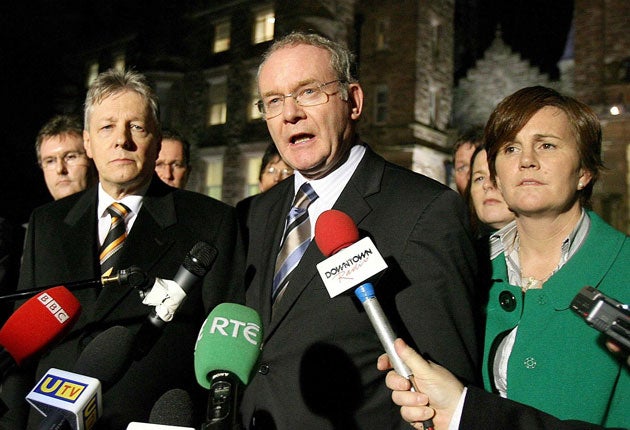Stormont back in business after months of deadlock

Your support helps us to tell the story
From reproductive rights to climate change to Big Tech, The Independent is on the ground when the story is developing. Whether it's investigating the financials of Elon Musk's pro-Trump PAC or producing our latest documentary, 'The A Word', which shines a light on the American women fighting for reproductive rights, we know how important it is to parse out the facts from the messaging.
At such a critical moment in US history, we need reporters on the ground. Your donation allows us to keep sending journalists to speak to both sides of the story.
The Independent is trusted by Americans across the entire political spectrum. And unlike many other quality news outlets, we choose not to lock Americans out of our reporting and analysis with paywalls. We believe quality journalism should be available to everyone, paid for by those who can afford it.
Your support makes all the difference.Northern Ireland's devolved government emerged from five months of suspended political animation yesterday with the Democratic Unionists and Sinn Fein resuming their seats around the cabinet table.
The ruling executive got back to business following the announcement by First Minister Peter Robinson and his deputy, Sinn Fein's Martin McGuinness, of a measure of agreement on policing and justice.
The tone of the encounter was markedly constructive, with both sides emphasising the need to address a series of mostly economic issues. The credit crunch took up more than half of the meeting, which lasted three and a half hours.
The principal source of disagreement has been over the transferring of policing and justice powers to the Belfast executive. The DUP and Sinn Fein agreed in principle that powers should be transferred but the DUP favoured a longer timetable, arguing that time was necessary to build more public confidence.
The two parties also objected to the idea of the other holding the justice post. In particular the DUP was dead against the possibility of Sinn Fein's Gerry Kelly, a one-time IRA jail-breaker, taking over policing.
There was also an impasse over a series of lesser issues, such as education, the status of the Irish language and the future of the Maze prison.
While these remain unresolved, yesterday's negotiations produced an agreed document containing a road-map with more than 30 points, leading towards policing devolution.
It lays out a path, involving six groups of actions, towards the transfer of powers, including legislation in both London and Belfast. It had already been agreed that for some time neither Sinn Fein nor the DUP will hold the justice post.
Since the document does not contain an actual deadline for the transfer of powers there have been claims that during the negotiations Sinn Fein fared less well than the DUP. The general sense, however, is that it is in essence a reasonable compromise.
The stand-off has been a trial of strength between the parties. Mr Robinson replaced Ian Paisley as First Minister in June, and republicans were clearly intent on demonstrating that he will not dominate them.
Yesterday's message, delivered amicably by Mr Robinson and Mr McGuinness, was that normal political business has now been resumed. The pace will in fact be stepped up, with extra meetings of the executive scheduled to deal with the backlog.
The parties have put a joint request to Gordon Brown to provide Northern Ireland with more money. They met him in Downing Street on Wednesday, and reported yesterday that he had agreed to £900m of additional funds.
Their emphasis on economic matters, and a co-operative approach, was stressed when they jointly opened a production plant in Belfast yesterday.
Saying that he believed problems had been resolved, Mr McGuinness said: "We've had our difficulties... but I believe we have resolved them to the satisfaction of both parties."
Mr Robinson said: "There was support from all for the work that we had done in securing the arrangements with the Prime Minister and Treasury, which perhaps takes some of the pressure off as we move on to the next stage of the credit crunch."
In particular, ministers claimed credit for achieving a further deferment of the introduction of water charges in Northern Ireland.
Join our commenting forum
Join thought-provoking conversations, follow other Independent readers and see their replies
Comments